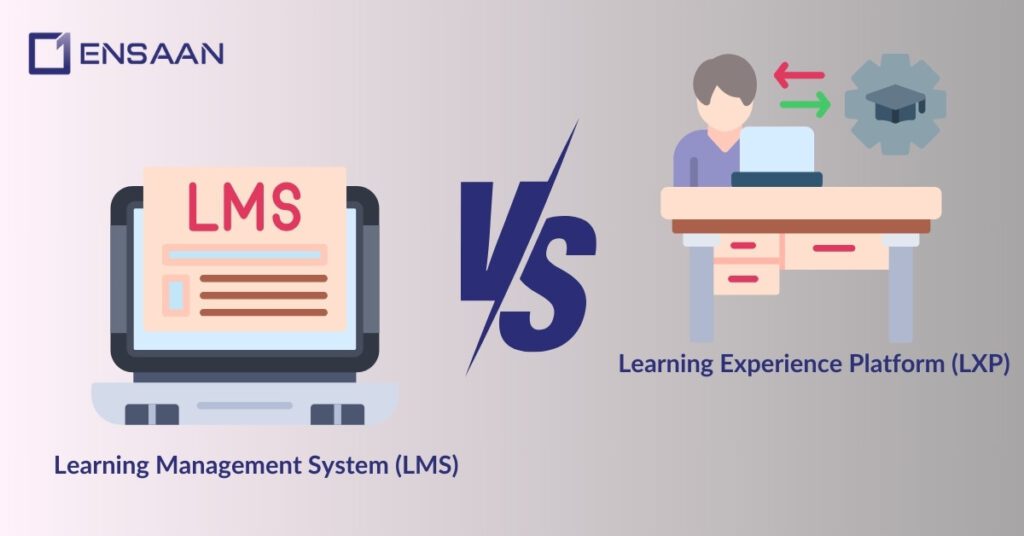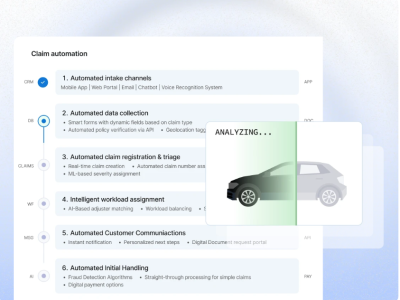Today’s fast-paced world makes employee training and development increasingly essential.
Have the necessary tools can make all the difference for onboarding new hires, upskilling your team or maintaining compliance.
Learning Experience Platforms (LXP) and Learning Management Systems (LMS) are highly utilized tools for employee development.
What are the differences, and which option would best serve your organization?
Let’s jump right in and explore this issue in greater depth.
Table of contents

What is a Learning Management System (LMS)?
A Learning Management System (LMS) is like a digital classroom.
Software platforms designed to assist organizations with managing, delivering and tracking training programs are increasingly popular solutions.
Think of it as an online hub where you can upload courses, assign them to employees, and track their progress.
Key Features of an LMS

1. Structured Learning:
An LMS is specifically tailored for formal, structured training. Courses are organized sequentially – Module 1, Module 2, etc – making it simple for employees to follow a predetermined path and complete their education step by step.
2. Tracking and Reporting:
An LMS offers one of the greatest advantages: tracking employee progress. You can see who has completed which courses, how well they performed and whether they met all requirements.
3. Compliance Training:
LMS platforms provide a great solution for providing mandatory training such as safety protocols, company policies or industry regulations to employees across an organisation. LMS ensures all necessary employees complete this necessary education to remain compliant within an organisation’s legal requirements.
4. Admin Control:
With an LMS, administrators have full control over the content. They can decide what courses to offer, who should take them, and when they should be completed.
5. Certification:
Most LMS platforms feature certification features that enable employees to receive certificates upon completing courses – this feature can be especially helpful in compliance training or professional development training programs.
Best For:
An LMS is ideal for organisations that need to deliver formal, structured training and ensure compliance. It’s commonly used in industries like healthcare, finance, and manufacturing, where mandatory training is a must.
What is a Learning Experience Platform (LXP)?
Learning Experience Platform (LXP) acts like Netflix for learning.
Modern, user-friendly platform focused on offering engaging learning experiences customized to individuals’ individual needs and self-directed study habits.
Instead of forcing information down from above, LXPs allow employees to explore content at their own pace and learn by discovery.
Key Features of an LXP
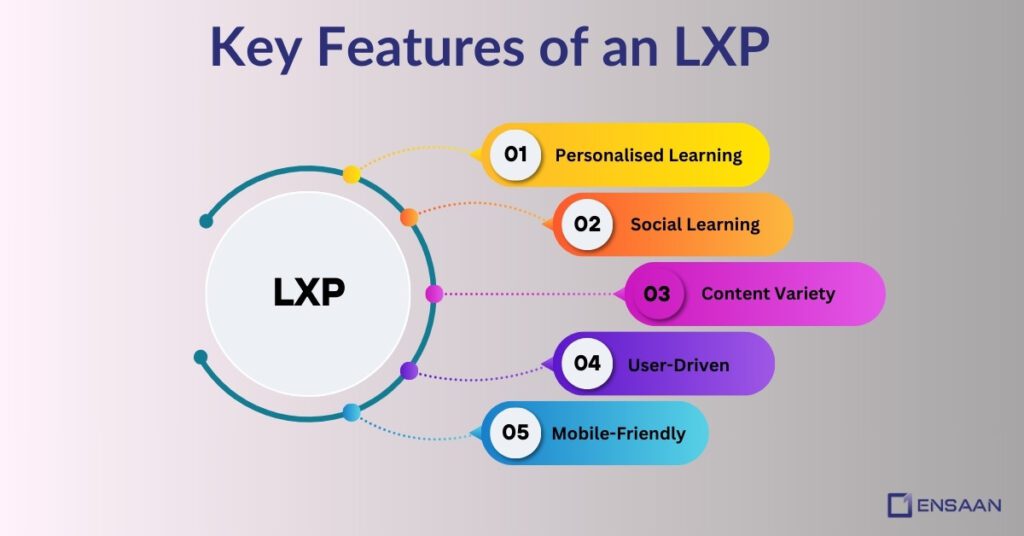
1. Personalised Learning:
LXPs use artificial intelligence (AI) to recommend content based on each learner’s role, interests, and goals – making the learning experience more tailored and relevant for all involved. This ensures a more engaging learning experience overall.
2. Social Learning:
LXPs foster collaboration and knowledge sharing among employees. Features like discussion forums, peer recommendations, and user-generated content make learning interactive and social.
3. Content Variety:
LXPs offer more variety in their content offerings compared to LMS platforms, which often focus on internal courses only. They pull content from external sources allowing employees to gain access to a wealth of knowledge.
4. User-Driven:
LXPs give employees more control over their learning journey by giving them the power to choose what, when, and how they would like to study content.
5. Mobile-Friendly:
Many LXPs are designed with mobile users in mind, making it simple and efficient for employees to learn while traveling or working remotely or hybrid workforces. This feature can prove particularly valuable.
Best For:
An LXP is ideal for organisations that want to foster a culture of continuous learning and employee-driven development. It’s particularly popular in tech-savvy industries and companies that value innovation and creativity.
LXP and LMS: What Are Their Differences?
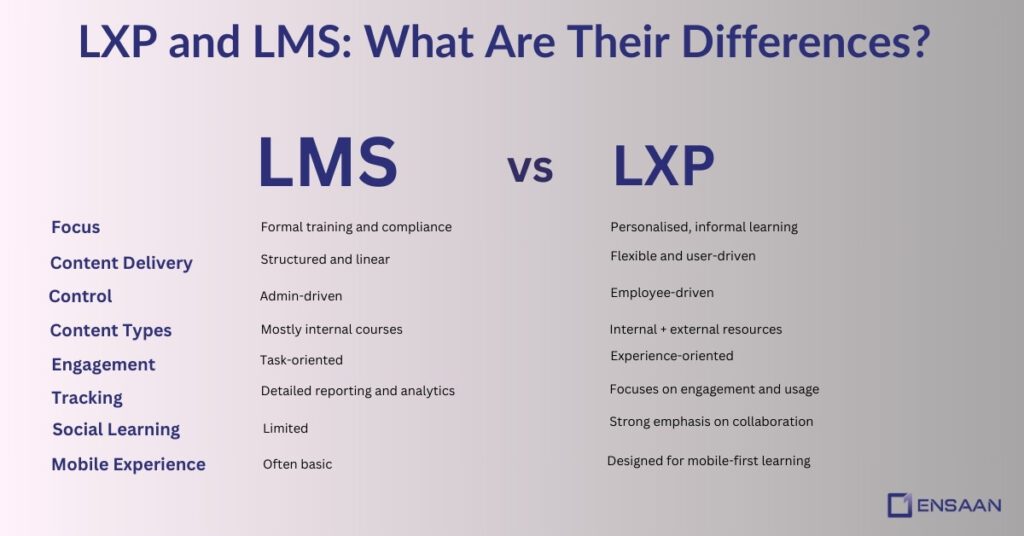
Let’s compare LXPs and LMSs side by side so you can better comprehend their differences:
| Feature | LMS | LXP |
|---|---|---|
| Focus | Formal training and compliance | Personalised, informal learning |
| Content Delivery | Structured and linear | Flexible and user-driven |
| Control | Admin-driven | Employee-driven |
| Content Types | Mostly internal courses | Internal + external resources |
| Engagement | Task-oriented | Experience-oriented |
| Tracking | Detailed reporting and analytics | Focuses on engagement and usage |
| Social Learning | Limited | Strong emphasis on collaboration |
| Mobile Experience | Often basic | Designed for mobile-first learning |
Which One Do You Need LMS or LXP?
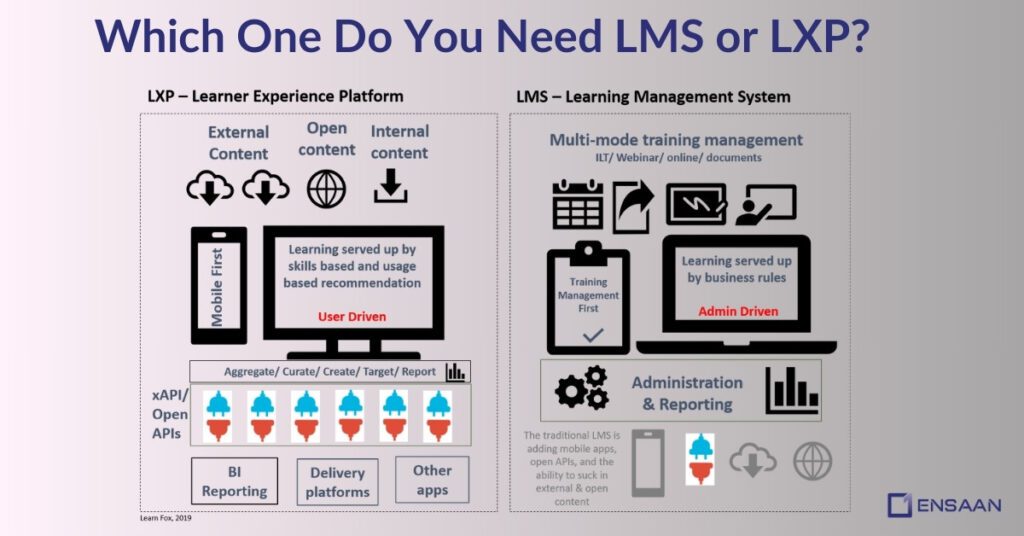
The choice between an LXP and an LMS depends on your organisation’s goals, culture, and training needs.
Here’s a closer look at when each platform might be the right fit:
Choose an LMS if:
- You Need to Deliver Mandatory Training:
If your organisation requires its employees to undergo compliance training for safety protocols or industry regulations, an LMS is an ideal way to make sure everyone completes these courses and keeps records to prove it.
- You Want to Track and Report on Progress:
An LMS provides comprehensive tracking and reporting features, making it simple for employees to track their own progress towards meeting training goals.
- Your Training is Formal and Structured:
If your training programs follow a more formal and structured curriculum, an LMS may be ideal as it allows for content delivery in an organized, linear fashion.
- You Need Certification:
An LMS is often the ideal solution when it comes to issuing certificates upon course completion; these systems are often utilized for professional development and compliance training programs.
Choose an LXP if:
- You Want to Encourage Continuous Learning:
If your goal is to foster an environment of continual learning and development, an LXP may be the optimal solution. Employees can take charge of their own education while exploring topics that interest them.
- You Want to Offer a Variety of Content:
An LXP provides access to a diverse selection of content types, such as videos, articles and podcasts from internal and external sources alike, giving employees access to an abundance of knowledge.
- You Value Personalisation:
Personalized learning experiences can be achieved using LXPs, which leverage AI technology to provide customized recommendations based on each learner’s role, interests and goals.
- You Want to Encourage Collaboration:
An LXP facilitates social learning through features like discussion forums, peer recommendations and user-generated content creation – this makes learning more engaging and interactive.
Can You Use Both LMS and LXP?
Absolutely! Many organizations employ both LMS and LXP in tandem for optimal results.
Here’s how you can take full advantage of both platforms:
- Use an LMS for Compliance and Mandatory Training:
An LMS can be the ideal way to provide mandatory training courses, such as safety protocols or company policies, which all employees must complete. With its records-keeping capability, an LMS ensures everyone completes these necessary courses successfully and that records exist to prove it.
- Use an LXP for Skill-Building and Career Development:
An LXP is an effective way of providing employees with various learning resources, while encouraging them to take charge of their own development. LXPs are excellent platforms for skill-building, career advancement and informal learning.
- Integrate the Two Platforms:
Organizations often combine LMS and LXP systems for an enhanced learning experience, using the LMS for mandatory training while the LXP provides additional resources and recommendations tailored specifically to individuals.

Conclusion
Both LXPs and LMSs offer distinct advantages; making the right selection will depend on your organisation’s specific requirements.
Depending on the nature of your training needs, an LMS might be more suited to compliance-oriented and structured courses; but if you want employees to take control of their own learning journeys, an LXP might be a better solution.
Frequently Asked Questions (FAQs)
An LMS provides structured, formal training, while an LXP emphasizes personalized and self-directed learning.
An LMS is best suited to compliance training as it monitors progress, ensures completion, and offers certificates upon successful completion of courses.
Absolutely! Many companies utilize both. An LMS can manage mandatory training while an LXP supports continuous learning and skill-development.
An LXP provides greater engagement because it offers personalized content, social learning opportunities and various learning formats.
If formal training and compliance tracking is crucial to you, select an LMS. If flexible learning experiences are more essential to you than ever, opt for LXPs instead. When both options are necessary, consider employing both technologies simultaneously.

